Riso (Regional Museum of Modern and Contemporary Art Palermo) hosts the first solo exhibition in Sicily of Frédéric Bruly Bouabré, father of African art and one of the most fascinating artists of our time, entitled Cosmogonies. We met the curator of the exhibition Cristina Costanzo and we asked her a few questions.
Mery Scalisi: In which way do you think the works of Frédéric Bruly Bouabré, linked above all to the theme of brotherhood between peoples, can be relevant today?
Cristina Costanzo: I find that research around Frédéric Bruly Bouabré can still find lifeblood in new exhibitions capable of suggesting transversal readings. The exhibition Frédéric Bruly Bouabré. World unbound, promoted by the MoMA in New York in 2022, as well as the presence of his works in the Côte d’Ivoire Pavilion at the last Venice Biennale have rekindled the attention on this extraordinary artist who, during his long career, took part in major exhibition projects. Suffice it to cite the case of Magiciens de la Terre, an exhibition curated by Jean-Hubert Martin in 1989, which played a seminal role in issues relating to non-European artists. I hope that Cosmogonie, Frédéric Bruly Bouabré’s first solo show in Sicily, will reach a wide audience, not only art lovers but also general public, interested in learning about his very personal way of building worlds starting from language.
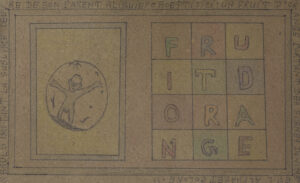
Frédéric Bruly Bouabré, Hommage a Alighiero Boetti, 1994, 21×35 cm, colored crayons and ballpoint pen on cardboard, ph. Iole Carollo, courtesy e 091 Art Project – Galleria d’Arte Moderna e Contemporanea e Riso. Museo regionale d’arte moderna e contemporanea di Palermo
How is the Cosmogonie exhibition organized? Does it include a chronological and/or thematic itinerary?
The exhibition is hosted in the spaces of the Foresteria of the Museum of Modern and Contemporary Art Palermo and follows a chronological itinerary that is divided into the two floors of the venue, where a large number of works created from the 1990s to 2008 are presented. The sixty works on display are dedicated to the themes that characterize the research by Frédéric Bruly Bouabré, from flags to legends, without neglecting the motif of the sun, which played a large part in his artistic choices. On 11 March 1948, as the artist himself declares, Frédéric Bruly Bouabré has a “vision divine” thanks to which he assumed the identity of Cheik Nedro, the one who does not forget. Thus Connaissance du monde, a monumental work in pen and colored pencils on cardboard, and Alphabet Bété, a transcription system of the Bété language consisting of 448 monosyllabic pictograms, were born. The exhibition Cosmogonie intends to offer a cross-section of this imaginary through a selection of the artist’s installations, oriented towards a fascinating verbal-visual component, a fundamental stylistic feature of his path, which is oriented both towards literature and visual arts.
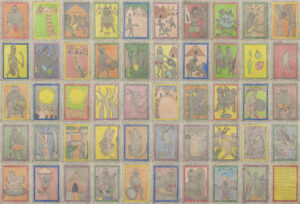
Frédéric Bruly Bouabré, Mitologie Bété. La légende de dedjaneugnon leParesseux,1997, 17×13 cm each, 50 elements, colored crayons and biro on cardboard, ph. Iole Carollo, courtesy e 091 Art Project – Galleria d’Arte Moderna e Contemporanea e Riso. Museo regionale d’arte moderna e contemporanea di Palermo
Can you tell us some curiosities about the bond that Frédéric Bruly Bouabré established with Alighiero Boetti?
As it is reported by documents and photographs, Alighiero Boetti was so fascinated by Frédéric Bruly Bouabré’s research that he wanted to join him, after the first meeting in Paris, in Abijan in the Ivory Coast, where Boetti stayed in 1994 before the Worlds Envisioned. Alighiero e Boetti Frédéric Bruly Bouabré exhibition at the DIA Center for the Arts in New York between 1994 and 1995. A trace of this important friendship also remains in the series of works on display Hommage a Alighiero Boetti from 1994 which, in the usual iconotextual form postcards made with colored crayons and biro, presents four images that can be traced back to as many moments of their meeting sealed by symbolic elements such as the sun, the orange and the sharing of the drawing.
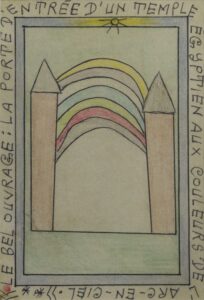
Frédéric Bruly Bouabré, Connaissance du monde. Le bel ouvrage, 1998,18×12 cm, colored crayons and ballpoint pen on cardboard, ph. Iole Carollo, courtesy e 091 Art Project – Galleria d’Arte Moderna e Contemporanea e Riso. Museo regionale d’arte moderna e contemporanea di Palermo
What was your approach, as curator, towards the artist and his production?
The exhibition was strongly desired and supported by 091 Art Project, a modern and contemporary art gallery based in Palermo which has been following the artist’s work for several years, collecting various works that focus on the Alphabet Bété and the legends, with particular attention to the brotherhood between peoples. The project was hosted at the Museum of Modern and Contemporary Art Palermo, directed by Maddalena De Luca, not only because its collection is chronologically similar to the works selected for Cosmogonies, but also because it is in line with the programming of the Museum, which is open to international authors and to central themes in contemporary artistic practices such as archiving. From a curatorial point of view, I consider it essential to read Frédéric Bruly Bouabré’s work in the perspective of a triangulation between archive, memory and cosmogony. The theme of iconotextuality is also of great charm, representative of the artist’s vocation to embrace complementary research fields such as literature, art, anthropology and religions. Also for this reason, the exhibition makes use of an interdisciplinary scientific committee made up of various specialists, to whom I am grateful. I am also particularly happy with the presence in the catalog of a conversation between Emmanuelle Spiesse, researcher at the LAM center – Les Afriques dans le monde, and Sylvestre Bruly Bouabré, the artist’s son, who reconstructs some little-known key points of Frédéric Bruly Bouabré’s career, and the contribution of Michele Cometa, aimed instead at investigating the deep connection in the work of this poet-painter between religious experience, the invention of the alphabet Bété and artistic creation.
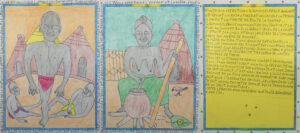
Frédéric Bruly Bouabré, Mitologie Bété. Le grand êtres dela mythologie Bété, 2005, 40×30 cm each, 3 elements, crayons and ballpoint pen on cardboard, ph. Iole Carollo, courtesy e 091 Art Project – Galleria d’Arte Moderna e Contemporanea e Riso. Museo regionale d’arte moderna e contemporanea di Palermo
What role does Frédéric Bruly Bouabré play in the art and culture of African countries?
Frédéric Bruly Bouabré occupies a leading position in the global scenario of our time. In the complexity of a question such as that of contemporary art in Africa, the studies of various specialists, from Okwui Enwezor to Cédric Vincent, prove to be of fundamental importance. They have contributed to deepen the subject in an articulated way and thus underlined the greater awareness – still necessary – towards the art of non-Western countries. But Frédéric Bruly Bouabré is much more than an artist. His figure emerges in the context of today’s art also thanks to his constant commitment to the cultures from the Ivory Coast, to his poetic production and philosophy and for having constantly worked to give a voice to his people.
Info:
Frédéric Bruly Bouabré | Cosmogonie
curated by Cristina Costanzo
28/04/2023 – 28/05/2023
Riso (Museo Regionale d’Arte Moderna e Contemporanea di Palermo)
via Vittorio Emanuele, 365, Palermo
www.museoartecontemporanea.it
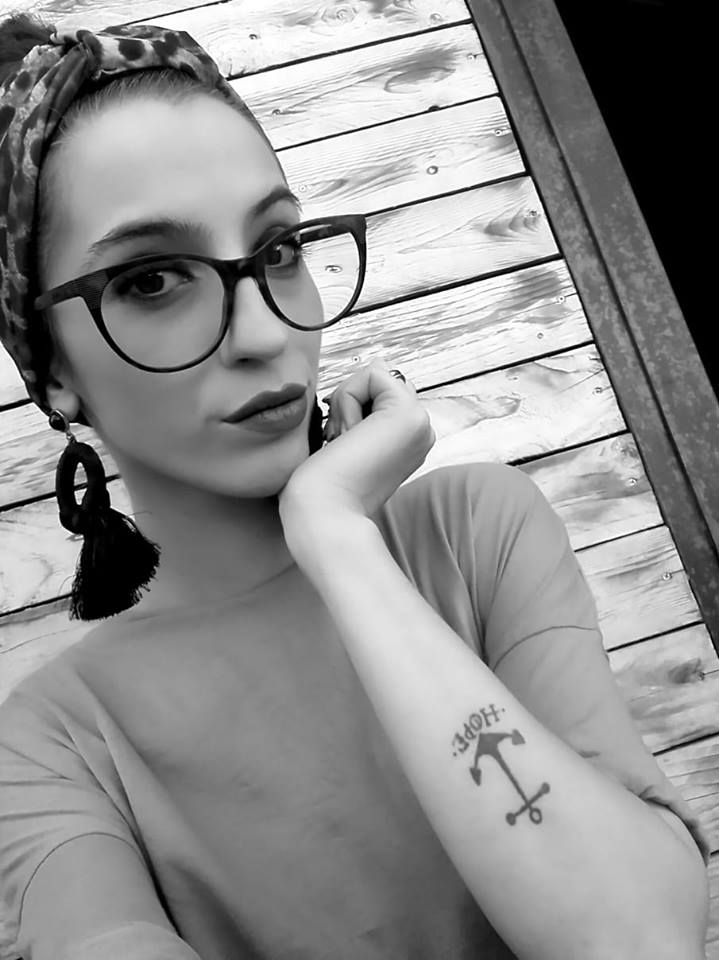
Graduate in Communication and enhancement of the historical artistic heritage and specialized in artistic design for the company, works in close contact with contemporary art, making this the key to reading for every work approach to which you moves. Art is life the motto around which her work / artistic experience revolves.




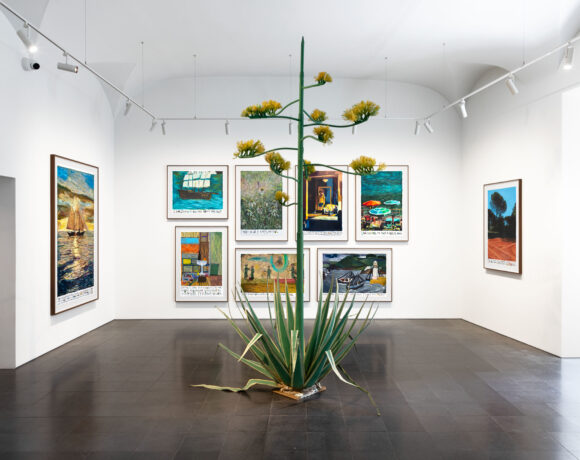

NO COMMENT